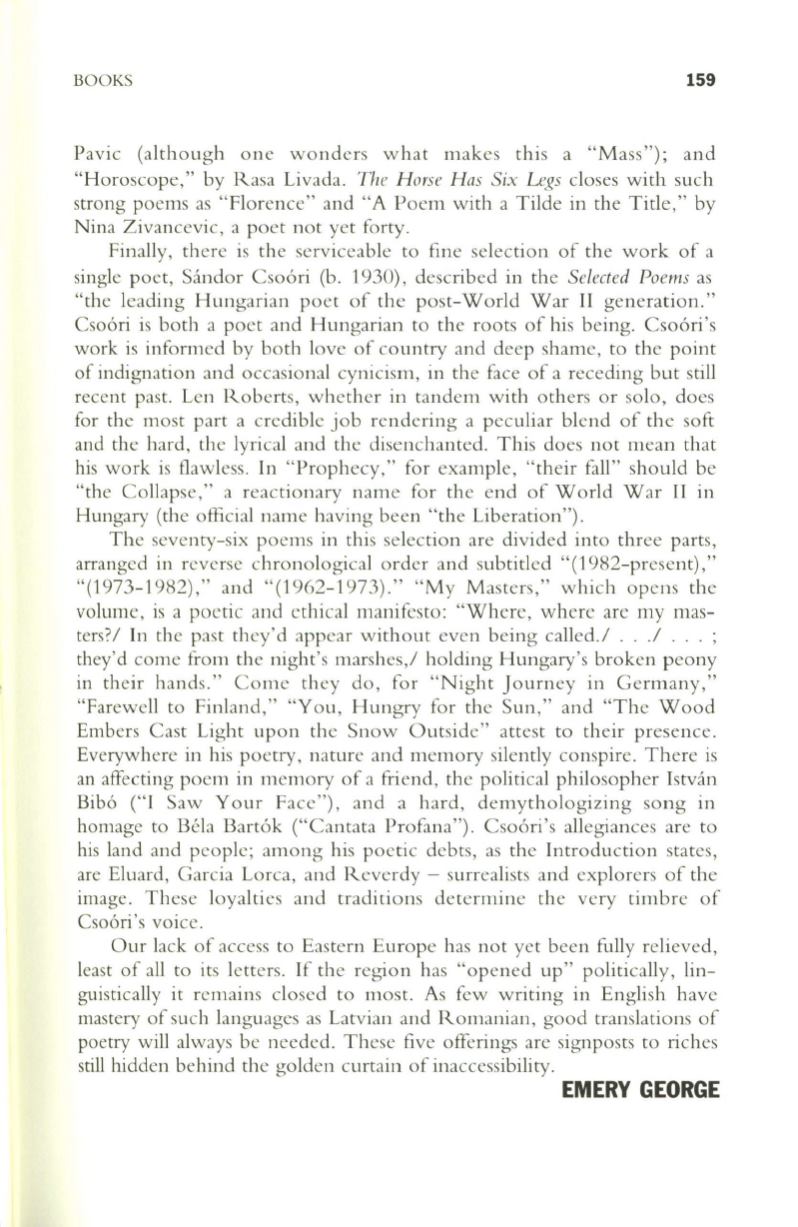
BOOKS
159
Pavic (although one wonders what makes this a "Mass"); and
"Horoscope," by Rasa Livada.
The Hoyse Has Six Legs
closes with such
strong poems as "Florence" and "A Poem with a Tilde in the Title," by
Nina Zivancevic, a poet not yet forty.
Finally, there is the serviceable to fine selection of the work of a
single poet, Sandor Csoori (b. 1930), described in the
Selected Poems
as
"the leading Hungarian poet of the post-World War [[ generation."
Csoori is both a poet and Hungarian to the roots of his being. Csoori's
work is informed by both love of country and deep shame, to the point
of indignation and occasional cynicism, in the face of a receding but still
recent past. Len Roberts, whether in tandem with others or solo, does
for the most part a credible job rendering a peculiar blend of the soft
and the hard, the lyrical and the disenchanted. This does not mean that
his work is flawless. In "Prophecy," for example, "their fall" should be
"the Collapse," a reactionary name for the end of World War II in
Hungary (the official name having been "the Liberation").
The seventy-six poems in this selection are divided into three parts,
arranged in reverse chronological order and subtitled "(1982-present),"
"(1973-1982)," and "(1962-1973)." "My Masters," which opens the
volume, is a poetic and ethical manifesto: "Where, where are my mas–
ters?/
In
the past they'd appear without even being called.! .. .! ... ;
they'd come from the night's marshes,! holding Hungary's broken peony
in their hands." Come they do, for "Night Journey in Germany,"
"Farewell to Finland," "You, Hungry for the Sun," and "The Wood
Embers Cast Light upon the Snow Outside" attest to their presence.
Everywhere in his poetry, nature and memory silently conspire. There is
an affecting poem in memory of a friend, the political philosopher Istvan
Bibo ("I Saw Your Face"), and a hard, demythologizing song in
homage to Bela Bartok ("Cantata Profana"). Csoori's allegiances are to
his land and people; among his poetic debts, as the Introduction states,
are Eluard, Garcia Lorca, and Reverdy - surrealists and explorers of the
image . These loyalties and traditions determine the very timbre of
Csoori's voice.
Our lack of access to Eastern Europe has not yet been fully relieved,
least of all to its letters. If the region has "opened up" politically, lin–
guistically it remains closed to most. As few writing in English have
mastery of such languages as Latvian and Romanian, good translations of
poetry will always be needed. These five offerings are signposts to riches
still hidden behind the golden curtain of inaccessibility.
EMERY GEORGE


